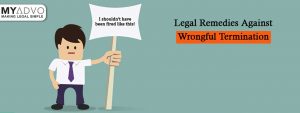Wrongful Discharge From Employment – Wrongful job termination
Wrongful job termination
In legal jargon, wrongful job termination, also known as wrongful termination or wrongful dismissal, is a scenario where the employment contract of an employee is terminated by an employer, where the dismissal contravenes one or more fundamental rules in employment law, or a statutory provision or rule contained in employment law. It may result from an inappropriate performance review, harassment, discipline, dismissal or other form of extraneous administrative action. In certain circumstances, there are arguments as to whether the employee was terminated for reasonable and lawful reasons. However, this must be determined from a number of perspectives, including the nature of the work done by the employee, his performance records and the employer’s reason for terminating him. There is also the possibility that, while the employee was performing satisfactorily, he was nevertheless let go because of improper reasons or if there was something that the employer failed to tell him about.
Normally, once a person is asked to leave the job, he is generally informed that he has just been fired. Sometimes, the employer also tells the person that he has just been dismissed. It is important to remember that the employment law in each country is different and what may be acceptable in one country, may not necessarily be so in another. In wrongful job termination situations, it is important for an employee to know and understand the legal position he is in, what is expected of him, the procedures to be followed and the consequences of his actions.

An employee should seek legal advice when he thinks that he has been unfairly dismissed. If he has been unfairly dismissed, he should not have been given a notice of dismissal, as this is contrary to the Employment Relations Act in many states. If he thinks that he was unfairly dismissed, he should speak to an employment attorney who can advise him on the next course of action. There are a few steps that may be taken by an employee in order to recover damages. The employee should seek advice from an employment lawyer on the best way to proceed.
Wrongful Discharge From Employment
If the employer has dismissed the employee, then the employee has the right to file a complaint before an employment tribunal. In such cases, the employee may choose to file a complaint under the Human Rights Act if he feels that his rights have been discriminated against due to the fact that he has been dismissed. Under the HRA, an employee can lodge a complaint about wrongful job termination up to a period of one year after the happening of the event. If the tribunal finds that there is discrimination, it will then give its decision after looking at all the evidence and listening to both the employee and the employer. The deciding officer is usually a barrister or a member of the Review Authority, and must be someone of the same sex and who is a senior citizen.
There are many scenarios that might lead to the need to appoint a perfect attorney to defend a case. For example, if an employee is facing a case of wrongful job termination, he should always seek help from an employment solicitor as soon as possible so that he is aware of his rights. A perfect attorney will help the employee to get back to work quickly. In addition, a perfect attorney will be able to ensure that he gets sufficient compensation for the damage caused to him. Therefore, even if it is necessary to consider appointing a perfect attorney, an employee should never do so without due care and consideration to the consequences.
Sometimes, employers resort to illegal methods to get rid of employees. For instance, an employer may fire an employee for complaining about an unsafe working condition. Such an action may amount to illegal dismissals. An employee, who is being unfairly dismissed, has the right to file a case of wrongful job termination. If the court decides in favor of the employee, then he would receive monetary compensation, legal advice, and even an apology from the employer.